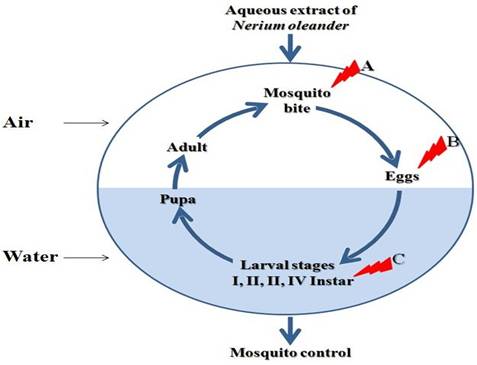Abstract
The objective of this study was to assess the mosquito controlling potential of aqueous extract of Nerium oleander leaves against the primary and secondary vectors of Japanese encephalitis (Culex tritaeniorhynchus and Cx. gelidus). Phytochemical screening of N. oleander leaves exhibited the presence of saponins, proteins, flavonoids, alkaloids, tannins, phenolic compounds, carbohydrates, glycosides, phytosterols, oil and fats. Extract treatment (1000 ppm) resulted in 100% mortality against 4th instar larvae of Cx. tritaeniorhynchus and Cx. gelidus. Extract treatment (1000 ppm) resulted in mild ovicidal activity (10±1.22% hatching) against Cx. tritaeniorhynchus, whereas, 100% ovicidal property against Cx. gelidus eggs. Extract treatment (1000 ppm) also delivered comprehensive protection from mosquito bite for 240 and 120 minutes against Cx. tritaeniorhynchus and Cx. gelidus, respectively. The results of this study suggest the mosquito controlling potential of N. oleander leaves and provides a potential option for the researchers to prepare natural, safe, and eco-friendly insecticide.
Full text article
Generated from XML file
Authors
Gaurav Kumar, Loganathan Karthik, Kokati Venkata Bhaskara Rao, Arivarasan Vishnu Kirthi, & Abdul Abdul Rahuman. (2023). Larvicidal, ovicidal and repellent activity of Nerium oleander leaves against Japanese encephalitis vectors. International Journal of Research in Pharmaceutical Sciences, 8(2), 157–162. Retrieved from https://ijrps.com/home/article/view/4553
Copyright (c) 2017 International Journal of Research in Pharmaceutical Sciences

This work is licensed under a Creative Commons Attribution-NonCommercial-NoDerivatives 4.0 International License.

